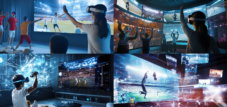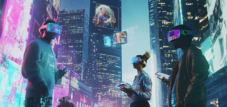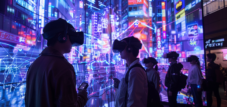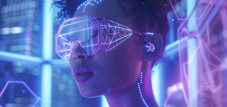Published on: March 31, 2025 / update from: March 31, 2025 - Author: Konrad Wolfenstein

AI transformation in VR development: How Meta conjures up 3D worlds from single images-Image: Xpert.digital
Meta Labs develop groundbreaking tool for 3D-VR-Welten
Future of VR creation: Lifestyle 3D worlds with new technology
A research team from the Meta Reality Labs in Zurich has presented an impressive technology that enables lifelike 3D environments for virtual reality glasses from a single picture. This innovation promises to change the way VR content is developed fundamentally and could be an important step towards democratizing the VR content creation. By combining different AI methods, the researchers manage to disassemble a complex and ambiguous task into manageable sub-problems and thus pave the way to simplified VR development.
Suitable for:
- More than just games: The true potential of AI in the Metaverse - from personalized worlds to the digital economy
The technological innovation behind METAS 3D-VR environmental generator
The technology developed by META represents a new approach to the AI-based generation of VR content. The process consists of several assembled steps, which together create a coherent 3D environment. First, coherent 360-degree panoramas are generated using a pre-trained diffusion model. These are then transferred to the third dimension by a metric depth assessor.
In the next phases of the process, a point cloud will be generated from the 3D data. A so-called inpainting model then fills up missing areas with information from these point clouds and thus ensures visual consistency. The end result is a 3D environment shown using Gaussian Splitting, which can be explored within a defined area in VR.
The research team, consisting of Katja Schwarz, Denis Rozumny, Samuel Rota Bulo, Lorenzo Porzi and Peter Konschieder, explains that the central knowledge of their work is to disassemble the complex and ambiguous task of creating a 3D environment from a single image into a number of better handling subtracts, each of which can be solved with existing techniques.
Flexibility of the input data
A remarkable property of the method is its versatility in terms of input data. The technology not only works with artificially generated images, but also with conventional photographs. In addition, even pure text descriptions of a scene can serve as input to generate high-quality 3D environments that are suitable for use in VR glasses.
Potential for the simplification of VR contents
The possibility of creating a complete VR environment from a single image or a text description has far-reaching implications for the creation of VR content. Traditional methods for the development of VR environments require considerable technical knowledge, specialized software and often a considerable amount of time.
METAS new technology could significantly reduce these hurdles and make the VR contestation accessible to a wider audience. For example, users could have a 3D environment created using the example of a single image and then explore them with Meta quest or use it as a starting environment.
Current restrictions and challenges
Despite the impressive progress, there are still some restrictions and challenges mentioned in the research paper. A significant limitation is navigation within the generated environment, which is currently limited to a cube with a side length of about 2 meters. The researchers explain that it is difficult to expand the navigable area beyond that, since the complexity of the task increases significantly.
In addition, the pipeline does not yet support real-time scennthesis. This means that the creation of the environment takes time. However, as soon as the Gaussian Splats environment is created, it can be displayed on a VR device in real time.
Classification in Metas strategic vision
The development of this 3D generation technology is a more comprehensive strategy for fusion of AI and immersive technologies. Mark Zuckerberg has repeatedly emphasized the vision of a meta verse, which is supposed to act as the successor to the mobile Internet.
Meta has continuously invested in the development of VR and MR technologies in recent years, from the Horizon family for social interactions in VR to the integration of AI assistants in VR environments. The ability to make appealing 3D environments easier is an important component for realizing this vision.
Suitable for:
AI as a catalyst for VR development
The technology demonstrated by Meta is an example of a larger trend: Artificial intelligence is increasingly becoming a catalyst for progress in VR development. Similar approaches can also be found in other areas, for example in the creation of AI-Avatars for immersive environments or for AI-supported virtual worlds such as Victoria VR, the Openai integration.
The combination of AI and VR opens up new opportunities for creating realistic, interactive and intuitive virtual experiences. In particular, the simplification of the development process and the reduction of technical entry hurdles could contribute to a broader adoption of VR technologies.
Future of the VR: What Metas 3D development has ready for us
The technology developed by META to generate 3D-VR environments from individual images marks a significant progress in the simplification of the VR content creation. The clever combination of different AI methods broke down a complex problem into solvable subtasks, which leads to impressive results.
It is not yet known when this technology will be available in commercial products such as the Meta Quest. According to the researchers, marketing does not seem to be too far. With continuous further development, the current restrictions such as the limited navigation area could be overcome.
The progressive integration of AI into VR technologies promises to revolutionize both the creation and use of virtual environments. Meta positions itself with innovations like this at the top of this development and paves the way for a future in which immersive digital experiences will be more easily created and will be more accessible to a wide audience.
Suitable for:
Your global marketing and business development partner
☑️ Our business language is English or German
☑️ NEW: Correspondence in your national language!
I would be happy to serve you and my team as a personal advisor.
You can contact me by filling out the contact form or simply call me on +49 89 89 674 804 (Munich) . My email address is: wolfenstein ∂ xpert.digital
I'm looking forward to our joint project.













